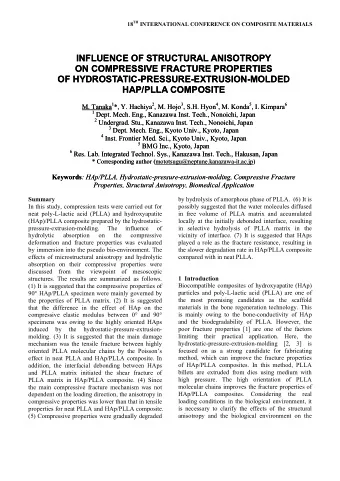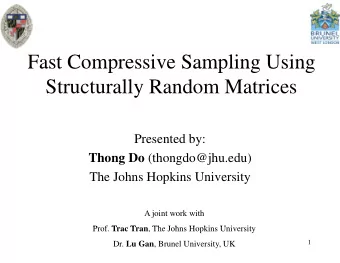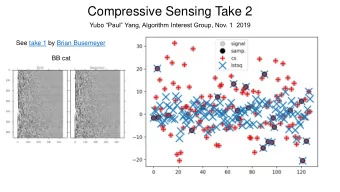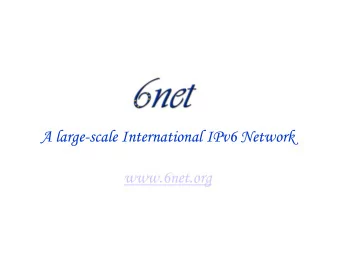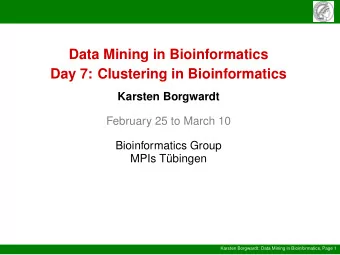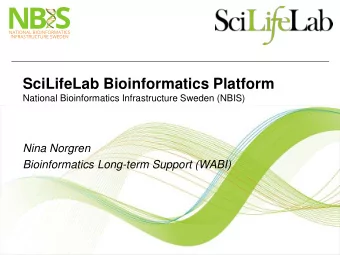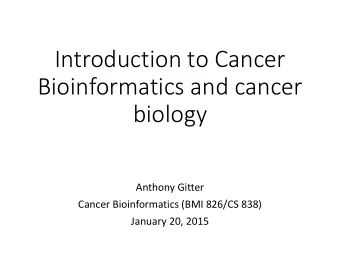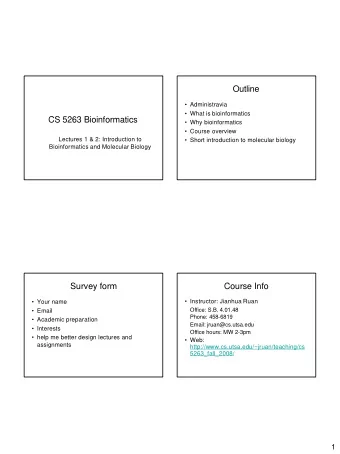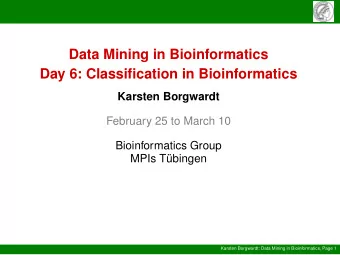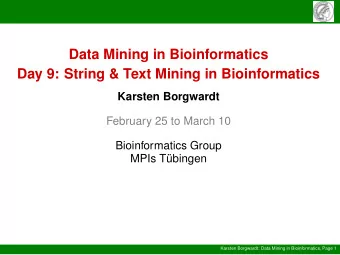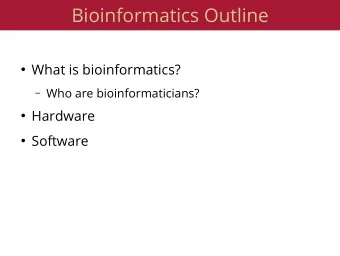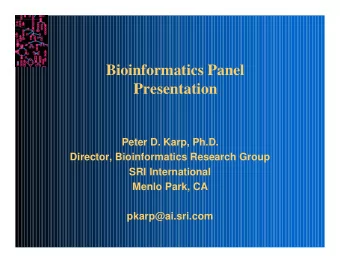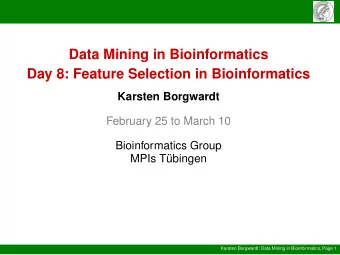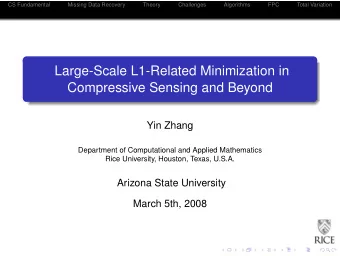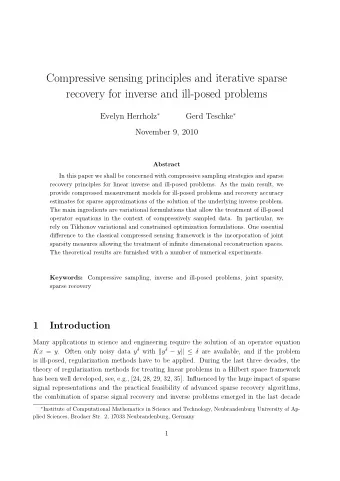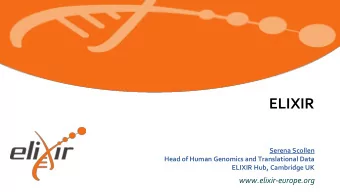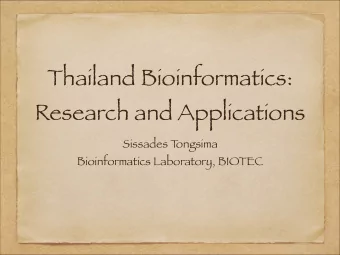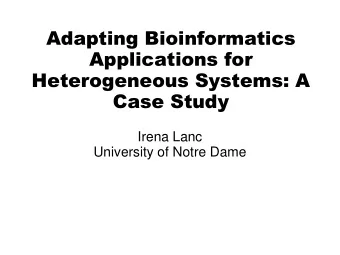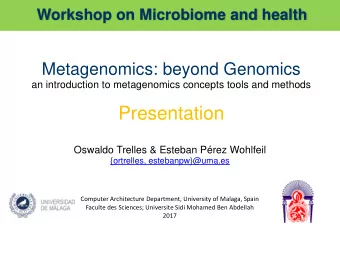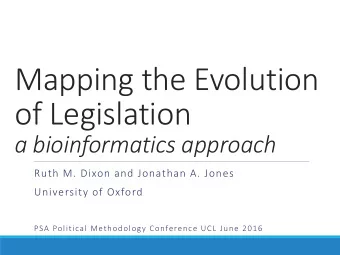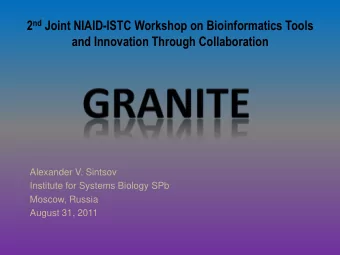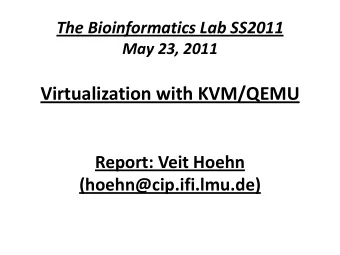
Compressive Structural Bioinformatics: Large-scale analysis and - PowerPoint PPT Presentation
Compressive Structural Bioinformatics: Large-scale analysis and visualization of the Protein Data Bank archive Peter W. Rose, Anthony R. Bradley, Alexander S. Rose, Yana Valasatava, Jose M. Duarte, Andreas Prli Structural Bioinformatics
Compressive Structural Bioinformatics: Large-scale analysis and visualization of the Protein Data Bank archive Peter W. Rose, Anthony R. Bradley, Alexander S. Rose, Yana Valasatava, Jose M. Duarte, Andreas Prli ć Structural Bioinformatics Laboratory San Diego Supercomputer Center UC San Diego PDB RCSB
PDB – A Billion Atom Archive > 1 billion atoms in the asymmetric units 120,000 structures in June 2016 PDB RCSB
Growing Structure Size and Complexity Largest asymmetric structure in PDB Largest symmetric structure in PDB HIV-1 capsid: PDB ID 3J3Q Faustovirus major capsid: PDB ID 5J7V ~2.4M unique atoms ~40M overall atoms PDB RCSB
Growing User Base PDB RCSB
à Scalability Issues • Interactive visualization • slow network transfer • slow parsing • slow rendering • Mobile visualization • limited bandwidth • limited memory • Large-scale structural analysis • slow repeated I/O • slow repeated parsing PDB RCSB
Compressive Structural Bioinformatics Efficiently store, transmit, and visualize 3D structures of biological macromolecules Perform large-scale structural calculations such as geometric queries or structural comparisons over the entire PDB archive held in memory PDB RCSB
Macromolecular 3D Structure Biological macromolecules: proteins, nucleic acids Biological macromolecules are polymers constructed by linking monomers by covalent bonds PDB RCSB
PDBx/mmCIF Flexible, extensible, and verbose format with rich metadata, well suited for archival purposes (mmcif.wwpdb.org) redundant annotations inefficient representation repetitive information PDB RCSB
MMTF • MacroMolecular Transmission Format (mmtf.rcsb.org) • Compact • fast network transfer, less I/O • Fast to parse • binary, no string parsing • Contains information for structural analysis and visualization • covalent bonds and bond orders • consistently calculated secondary structure PDB RCSB
MMTF Compression Pipeline extract structural integer encoding data recursive dictionary encoding GZIP calculate bonds, indexing run-length encoding SSE delta encoding Binary, extensible container format of MMTF It's like JSON. but fast and small. PDB RCSB
Size and Parsing Speed mmCIF vs. MMTF for 120,000 Structures Small Fast 30 GB 400 min 7 GB < 2 min mmCIF MMTF mmCIF MMTF Whole PDB archive GZIP compressed Mac mini with 2.6 GHz Intel Core i5 (MMTF reduced/lossy: ~800 MB) (4 cores) and 16GB RAM using PDB RCSB
Data Mining using Apache Spark mmCIF vs. MMTF Find all C-alpha-C-alpha contacts 448 404 Inefficient looping algorithm Efficient hashing algorithm 50 6 mmCIF MMTF PDB RCSB
Download + Parsing time MMTF vs. mmCIF Time (seconds) to download * 100 large PDB structures from UCSD and parse with JavaScript decoder in Chrome browser Russia 557 MMTF failed mmCIF Switzerland 1589 MMTF Bethesda, MD 4431 mmCIF 85 MMTF Japan San Diego, CA 2418 mmCIF 79 MMTF 36 MMTF 2838 mmCIF 840 mmCIF *Note: download times are highly variable and not representative PDB RCSB
Community Engagement • Open source specification • Open source decoding libraries • Java • JavaScript • Python • C/C++ (developed by community members) • Applications using MMTF • 3Dmol.js, JSmol, iCn3D(NCBI), ICM Viewer, PyMol • BioJava, Biopython, MDAnalysis • RCSB PDB website PDB RCSB
Summary • MacroMolecular Transmission Format (MMTF, mmtf.rcsb.org) • Compressed, binary, efficient representation of 3D structures • Lossless representation (~4x compression) • Lossy, reduced representation (~37x compression) • Compressive Structural Bioinformatics • Algorithms, application, and workflows using MMTF • 10 to 100+ fold speedup Structure Visualization Large Scale PDB Mining Web-based molecular graphics for large complexes (2016) Web 3D ‘16, 185-186, DOI: 10.1145/2945292.2945324 PDB RCSB
Acknowledgements Funding: NCI/NIH (U01 CA198942) MMTF Early Adopters PDB RCSB
Recommend
More recommend
Explore More Topics
Stay informed with curated content and fresh updates.
